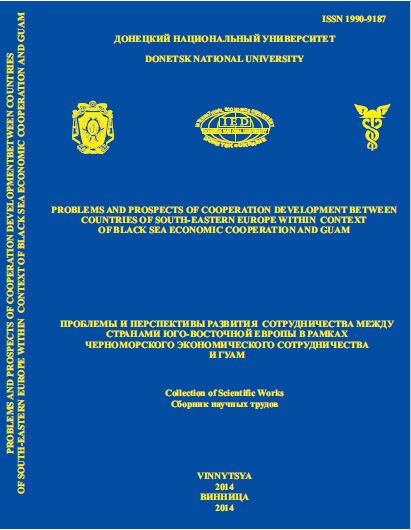The role of organizational culture in achievement of the balance between “life and work” (by the example of tourist organizations in Ukraine)
Keywords:
organizational culture, the balance between «life and work», tourist enterprise, hotel businessAbstract
The article reveals some approaches to the notion of the balance between “life and work”. There are given constituents of the notion “work and life”, also we offered basic orientations of policy in achievement the correspondent balance, analyzed possible consequences of establishment/violation for a person or business, in particular for enterprises in the tourism and hospitality sphere. There are given and analyses survey results of the specialists in tourist enterprises concerning the balance between working and free time. Several kinds of organizational culture are outlined and given monitoring results on these kinds in tourist agencies of Dnipropetrovs’k and Dnipropetrovs’k region. We determined that adherence of the employees of recreational enterprises to their working places depends on their awareness of the possibility in achievement in the working place the balance between working and free time. Secondly, we found out that employer’s help was more important than family support as to reducing stress and leveling industrial conflicts. Thirdly, there exist significant dependence between employee turnover in tourist and some other enterprises and unbalancing between «public» and «individual». There is emphasized the role of organizational culture in finding the compromise between public and private, and given recommendations as to its reinforcement.References
Chandra, V. Work–Life Balance: Eastern and Western Perspectives. The International Journal of Human Resource Management, Vol. 23, No. 5, March 2012, р. 1040–1056 Retrieved from: http://content.ebscohost.com.vlib.interchange.at/ContentServer.asp?T=P&P=AN&K=71347081&S=R&D=buh&EbscoContent=dGJyMNHr7ESeprc4 zOX0OLCmr0yep7JSs6e4SraWxWXS&ContentCustomer=dGJyMOzprlCvq7VRuePfgeyx44Dt6fIA
Walker, E.; Wang, C.; Redmond, J. (2008). Women and Work-Life Balance: Is Home-Based Business Ownership the Solution? Equal Opportunities International, 27 (3), p. 258-275
Adya, M.P. (2008). Women at Work, Differences in IT Career Experiences and Perceptions between South Asian and American Women. Human Resource Management, 47, 3, р. 601–635
Hassan, Z. (2010). Work-Family Conflict in East vs Western Countries. Cross Cultural Management: An International Journal, 17, 1, р. 30–49.
Hyman, J.; Summers, J. (2004). Lacking Balance? Work-Life Employment Practices in the Modern Economy. Personal Review. Vol.33 Iss: 4, p. 418-429.
Bansal, I.; Sharma, R. (2012). Achievement Motivation of Managers in Relation to Their Gender: A Study with Specific Reference to ONGC. Asian Journal of Research In Business Economics and Management, Vol. 2, Issue 6, р. 2249-7307.
Drew, E.; Humphreys, P.C.; Murphy, C. (2003). Off The Treadmill: Achieving Work/Life Balance: National Framework Committee for Family Friendly Policies: Dublin. 140 р.
Bradley, L.M.; Royer, S.; Eckardt, F. (2008). There is a Link between Work Life Balance Culture and Strategic Competitive Advantage. In: 22nd ANZAM Conference 2008: Managing in the Pacific Century, 2 – 5 December, Auckland, New Zealand. р. 1-17.
Thompson, C. A.; Beauvais, L. L.; Lyness, K. S. (1999). When Work-Family Benefits are not Enough: the Influence of Work-Family Culture on Benefit Utilization, Organizational Attachment, and Work-Family Conflict. Journal of Vocational Behavior, 54, р. 392-415.
Major, D. A.; Fletcher, T. D.; Davis, D. D.; Germano, L. M. (2008). The Influence of Workfamily Culture and Workplace Relationships on Work Interference With Family: A Multilevel Model. Journal of Organizational Behavior, 29, р. 881–897.
Allen, T. D. (2001). Family-Supportive Work Environments: the Role of Organizational Perceptions. Journal of Vocational Behavior, 58 (3), р. 414–435.
Lazăr, I; Osoian, C.; Raţiu, P. (2010). The Role of Work-Life Balance Practices in Order to Improve Organizational Performance. European Research Studies, Volume XIII, Issue (1), р. 201-214.
Vloeberghs, D., (2002). An Original and Data Based Approach to the Work-Life Balance. Equal Opportunities International, Vol.21, Issue 2, p. 25-57.
Murphy, F., & Doherty, L. 2011. The Experience of Work Life Balance for Irish Senior Managers. Equality, Diversity and Inclusion: an International Journal, Emerald Group Publishing Limited, Vol.30, Issue 4, p. 252-277.
Ma, Y. (2008). Raising Half the Sky Work–Life Balance of Chinese Female Administrative Workers. Auckland University of Technology. School of Business. 242 р. Retrieved from: http://aut.researchgateway.ac.nz/bitstream/handle/10292/501/MaY.pdf?sequence=6 .
Bell, A.S.; Rajendran, D.; Theiler, S. (2012). Job Stress, Wellbeing, Work-Life Balance and Work-Life Conflict Among Australian Academics. Electronic Journal of Applied Psychology. 8(1), р. 25-37 Retrieved from: http://www.researchgate.net/publication/259467880_Job_Stress_ Wellbeing_Work-Life_Balance_and_Work-Life_Conflict_Among_Australian_Academics.
Millear M.R. (2010). Adapting to the Work-Life Interface: the Influence of Individual Differences, Work and Family on Well-Being, Mental Health and Work Engagement. Doctoral Thesis. 535 p. Retrieved from: http://eprints.qut.edu.au/39183/1/Prudence_Millear_Thesis.pdf
Smeaton D.; Ray K.; Knight G. (2014). Costs and Benefits to Business of Adopting Work Life Balance Working Practices: A Literature Review Policy Studies Institute Published, June 2014, 173 р. Retrieved from: https://www.gov.uk/government/uploads/system/uploads/attachment_data/ file/323290/bis-14-903-costs-and-benefits-to-business-of-adopting-work-life-balance-working-practices-a-literature-review.pdf
Stepanova, O. (2012). Work Life Balance in Organizational Substructures: the Case of Mutua. Doctoral Thesis. 175 р. Retrieved from: http://www.tdx.cat/bitstream/handle/10803/107963/ os1de1.pdf;jsessionid=AD4B5BE6B8B898F40264CA2FE4EFA367.tdx2?sequence=1
Bucek, C. The Impact of Work-Life Balance on the Relaxation Effect of Holidays. Modul University. Vienna, November 28th, 2013. 154 р. Retrieved from: http://www.modul.ac.at/uploads/files/Theses/Master/Thesis_-_2013_-_MSC_-_Bucek.pdf
Deery, M.; Jago, L. (2009). A Framework for Work – Life Balance Practices: Addressing the Needs of The Tourism Industry. Tourism and Hospitality Research. Vol. 9, 2, р. 97-108 Retrieved from: http://www.jhta.org/app/webroot/uploads/FrameWork_For_Work-Life_Balance.pdf
Hsieh, Y. (2010). B&B Innkeepers in the United States: When the Boundary between Work and Personal Life is Blurred. Journal of Human Resources in Hospitality and Tourism, 9 (2), р. 200-217 Retrieved from: http://libres.uncg.edu/ir/uncg/f/Y_Hsieh_BB_2010.pdf
O’Neill, J.W. (2012). Using Focus Groups as a Tool to Develop a Hospitality Work-Life Research Study. International Journal of Contemporary Hospitality Management. Vol. 24 No. 6, p. 873-885 Retrieved from: http://www.personal.psu.edu/faculty/j/w/jwo3/documents/HotelFocusGroupArticle.pdf

